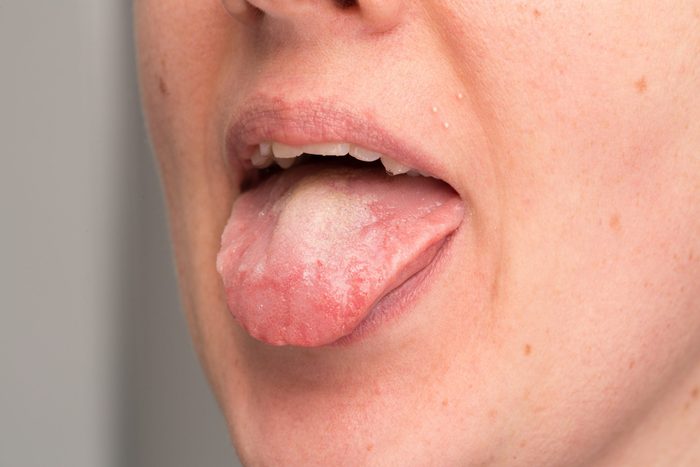Diet.drink.with.apple.cider Vimiger
Apple Cider Vinegar Diet: Does It Really Work?
Is this diet fad all it's cracked up to be?
 New Africa/Shutterstock
New Africa/Shutterstock
What's the deal with apple cider vinegar?
Apple cider vinegar is having a moment with celebrities attributing their shiny hair and perfect skin to it. Apple cider vinegar has also been credited for help with losing water weight and easing troubled tummies. Some studies show this type of vinegar can lower blood sugar, aid in weight loss, lower cholesterol and triglycerides and help cure fungal infections, according to Medical News Today. Those are just some of the ways apple cider vinegar can benefit your health.
The vinegar is made with apples in a two-step fermentation process, according to Medical News Today. After the apples are crushed, they're combined with yeast to convert the apples' natural sugar into alcohol; next, bacteria are added to transform the alcohol to acetic acid, which is vinegar. For all the wonders supposedly contained in a tablespoon of apple cider vinegar (or ACV), you'll only get about three calories—and no carbs.
 Michelle Lee Photography/Shutterstock
Michelle Lee Photography/Shutterstock
What is the apple cider vinegar diet?
The apple cider vinegar diet is really just about adding the vinegar to your daily routine. Most people take apple cider vinegar "doses" in the form of one to two teaspoons of ACV before or with meals, according to To The Pointe Nutrition owner Rachel Fine, MS, RD, CSSD, CDN. Some people mix it with water, while others take apple cider vinegar pills. But as with all new diets, there are things doctors and experts want you to know about the apple cider vinegar diet.
 Gilmanshin/Shutterstock
Gilmanshin/Shutterstock
The history of apple cider vinegar
While the apple cider vinegar diet is being hailed as a new trend, using apple cider vinegar for health benefits goes back centuries. According to Business Insider, the Greek physician Hippocrates recommended the vinegar for treating coughs and colds—that was around 400 BCE. In the 1300s, Italian physician Tommaso Del Garbo washed his hands, face, and mouth with vinegar to prevent infection. Roman soldiers drank it mixed with water as a refreshing thirst quencher.
 Vinnikava Viktoryia/Shutterstock
Vinnikava Viktoryia/Shutterstock
Apple cider vinegar effects on weight, cholesterol, and blood sugar
The claims for ACV are pretty impressive: Lower blood sugar and cholesterol, weight loss, antibacterial properties, and better hair and skin are just some of the benefits people attribute to apple cider vinegar. But the studies behind some of this are shaky."Sources claim apple cider vinegar can be great for digestion, glucose control, and weight loss, but there is limited research on apple cider vinegar," says Amanda A. Kostro Miller, RD, LDN, who serves on the advisory board for Smart Healthy Living. She adds the research on ACV has limitations and is still in the early phase—it's not enough to alter nutrition guidelines.One 2015 study found promising results in vinegar's ability to lower blood sugar when people down it before a meal. However, the study used eight men and didn't actually use apple cider vinegar (though the vinegar had a similar acetic acid content). A study from 2018 found a small reduction in blood sugar levels, but scientists said more research was needed before deeming this an official treatment.
When it comes to weight loss, another 2018 study revealed that overweight or obese individuals who took 300 milliliters of apple cider vinegar a day while on a restricted diet lost weight and had lower triglyceride and cholesterol levels. The study authors determined that apple cider vinegar might be helpful for losing weight and lowering triglyceride and cholesterol levels, but that the results only applied to overweight people who were also dieting. Unlike these verified tips on weight loss, experts warn this limited research doesn't mean much when it comes to apple cider vinegar. "Sadly we do not have compelling evidence that apple cider vinegar can do anything beyond provide unique flavor to food," says Monica Auslander Moreno, MS, RD, LD/N, nutrition consultant for RSP Nutrition.
 sruilk/Shutterstock
sruilk/Shutterstock
Antifungal and antibacterial properties of apple cider vinegar
Some reports suggest apple cider vinegar may be helpful in battling fungal infections caused by Candida albicans. This is a common fungal infection caused by yeast and normally lives inside the mouth, throat, gut, vagina, or on the skin, according to the Center for Disease Control. Candida yeasts can cause infections if they grow out of control or grow into internal organs or the bloodstream. There are several case reports of apple cider vinegar helping clear up Candida infections, according to Medical News Today. A test tube study confirmed that apple cider vinegar containing 4 percent maleic acid can also kill a species of Candida that causes fungal infection for people who wear dentures. Studies have been done in test tubes to determine apple cider vinegar's antibacterial properties, and the results are fairly positive: The vinegar seems to work against staph infections and infection-causing bacteria in the gut. While ACV may have potential as a treatment for these bugs, tests on people need to be done first.
 Aquarius Studio/Shutterstock
Aquarius Studio/Shutterstock
Apple cider vinegar and your hair
People tout apple cider vinegar as a cure-all for hair woes, claiming it can soften hair, add shine, prevent split ends, cure dandruff, prevent hair loss, and promote hair growth. But like many other apple cider vinegar claims, the research is dubious. Medical News Today reports no studies have confirmed the benefits of apple cider vinegar helping your hair or skin for that matter, as some people use it as an acne treatment. Try these hair tips from around the world if you want to see results.
 Bignai/Shutterstock
Bignai/Shutterstock
Side effects of the apple cider vinegar diet
Asides from possibly not paying off, the apple cider vinegar diet may be dangerous for some people. Studies suggest that taking apple cider vinegar slows the digestive process.Miller warns this could be problematic for anyone with digestive troubles. Gastroparesis—slowed down digestion—is caused by damage to the vagus nerve which regulates the stomach system, according to WebMD, and can cause heartburn, nausea, vomiting, and bloating. It can force food to stay in the digestive system too long which can lead to bacteria growth and intestine obstructions. Gastroparesis is often a complication of diabetes. Apple cider vinegar further slows the digestive process which can increase symptoms of gastroparesis. You may also want to avoid this trend for the sake of your smile, as well."Vinegar is acidic and too much contact with acidic foods can weaken tooth enamel which leads to tooth decay," says Isabel Butler, company nutritionist at Spoon Guru. These are just some of the apple cider vinegar mistakes you might be making.
 alexnika/Shutterstock
alexnika/Shutterstock
Incorporating apple cider vinegar into your diet
If you still want to give apple cider vinegar a try, there are a few ways you can work it into your diet. Finesuggests taking one to two teaspoons throughout the day. "It should not be taken as a 'shot' as it can be quite corrosive to the esophagus," recommends Moreno. "It should always be blended into a salad dressing and neutralized with oil or other ingredients like herbs, spices, avocado, or cream. It can also be used in the making of pickled vegetables as the pickling medium. Opt for pasteurized apple cider vinegar: The raw version may harbor bacteria dangerous to those with compromised immune systems. " Of course, you might be better off waiting on the research before diving into the apple cider vinegar diet. In fact, always check the research before trying one of these other food habits that really aren't good for you.
Every product is independently selected by our editors. If you buy something through our links, we may earn an affiliate commission.
Originally Published: May 08, 2019
Sign up for articles sent right to your inbox
Enjoy the best stories, advice & jokes delivered right to your inbox!

Subscribe & SAVE Save Up To 84%!
Diet.drink.with.apple.cider Vimiger
Source: https://www.rd.com/list/apple-cider-vinegar-diet/